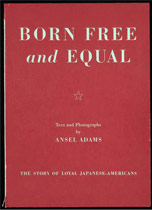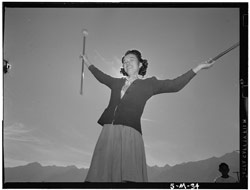Ansel Adams’ Foray into Photojournalism at Manzanar
 Ansel Adams’ little known book Born Free and Equal: The Story of Loyal Japanese-Americans at Manzanar Relocation Center, Inyo County, California, is now the focus of an exhibit at the Bainbridge Island Historical Museum in Washington. A copy of the original book has been printed out for display at the Ansel Adams: A Portrait of Manzanar exhibit. A selection of the Manzanar photographs, some never shown publicly, are also on display through Dec. 7. Adams, who captured iconic black and white images of Yosemite National Park and the American West, took a more photojournalistic approach for the book, interviewing internees as well as documenting moments of their daily lives with pictures. Originally published in 1944, the American public received Born Free and Equal with mixed reactions. According to the Library of Congress website, the book garnered positive reviews and a spot on the Francisco Chronicle‘s bestseller list. In contrast a recent Seattle Times article reports that the book also incited protests, was publicly burned and condemned as “disloyal”.
Ansel Adams’ little known book Born Free and Equal: The Story of Loyal Japanese-Americans at Manzanar Relocation Center, Inyo County, California, is now the focus of an exhibit at the Bainbridge Island Historical Museum in Washington. A copy of the original book has been printed out for display at the Ansel Adams: A Portrait of Manzanar exhibit. A selection of the Manzanar photographs, some never shown publicly, are also on display through Dec. 7. Adams, who captured iconic black and white images of Yosemite National Park and the American West, took a more photojournalistic approach for the book, interviewing internees as well as documenting moments of their daily lives with pictures. Originally published in 1944, the American public received Born Free and Equal with mixed reactions. According to the Library of Congress website, the book garnered positive reviews and a spot on the Francisco Chronicle‘s bestseller list. In contrast a recent Seattle Times article reports that the book also incited protests, was publicly burned and condemned as “disloyal”.
Adams’ text reflects the social ambivalence of the era surrounding the internment of Japanese-Americans. He wavers between feelings of justification at protecting the nation’s safety during wartime and injustice in imprisoning innocent, hardworking people. In the forward, President Roosevelt’s secretary of the interior, Harold Ickes, shows none of that ambivalence when he plainly states: “To condone the whittling away of the rights of any one minority group is to pave the way for us all to lose the guarantees of the Constitution.”
As the book progresses, and Adams speaks to more internees, he more openly acknowledges the racial injustice of the situation, noting that most Americans “do not make this assumption of disloyalty in regard to our citizens of German and Italian descent.” He begins to view the mistreatment of Japanese-Americans as “a truly regrettable stain on the record of our democracy.”
“It is our task to retain the individual as the foundation of society, irrespective of his race, color, or religion. It is a problem we must face and solve — no matter what the cost may be to our false dignity or imagined self-interest,” Adams states boldly.
In 2002, Spotted Dog Press reissued a hardcover edition of Born Free and Equal, which includes corrections for historical accuracy and personal essays from surviving internees. A PDF of the original publication is available as a free download on the Library of Congress website.


